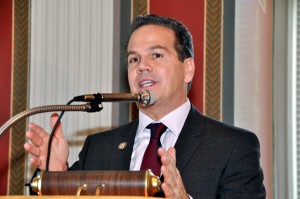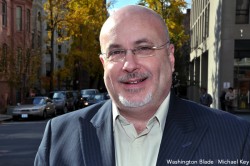National
Gay House, Senate candidates running strong
Numbers show Baldwin, others winning fundraising battles

Gay and lesbian candidates for the U.S. House and Senate are competitive with — and in some cases besting — their straight opponents when it comes to raising money.
Fundraising numbers for the fourth quarter of 2011 and the year in total became public earlier this month after candidates submitted their campaign filings in accordance with federal election law.
Rep. Tammy Baldwin, who’s seeking to become the first openly gay U.S. senator, made a particularly impressive showing in the final quarter in her bid to represent Wisconsin in the Senate by taking in $1.16 million.
The fourth quarter haul means the Democrat and seven-term House member raised $2.5 million last year for her Senate campaign. She has $1.8 million in cash on hand.
Phillip Walzak, a Baldwin spokesperson, said the number demonstrates the strength of her campaign.
“These figures demonstrate the strength of Tammy’s grassroots campaign, and the depth of support for her message to stand up for our shared values, and put the people ahead of right-wing radicals and corporate special interests,” Walzak said.
Nathan Gonzales, editor of the Rothenberg Political Report, said Baldwin won’t “lose the Senate race because she doesn’t have enough money,” although it remains a toss-up and could be “one the top general elections in the country.”
Gonzales added he doesn’t think Baldwin’s sexual orientation will factor into the race heading into the general election.
“I see Republicans talking about her just being from Madison and how being a liberal Democrat from Madison puts her out of touch with the rest of the state rather than making her sexuality an issue,” Gonzales said.
Republican candidates in the race don’t come close to Baldwin in fundraising. Former Wisconsin Gov. Tommy Thompson raised $657,000 and has $544,000 in cash on hand. Former congressman and gubernatorial candidate Mark Neumann raised $826,000 and has $552,000 in cash on hand.
Denis Dison, spokesperson for the Gay & Lesbian Victory Fund, said Baldwin has “lapped everybody in the field” of Republicans.
“They’re going to be spending that money in the primary,” Dison said. “This is going to be a pretty ugly primary on the Republican side. They’re really going to have to spend all the way to win their nomination.”
Democrat Mark Takano, a gay public school teacher and member of the Riverside Community College District’s Board of Trustees, is also on top in fundraising for the race to represent California’s newly created 41st congressional district — although by a much slimmer margin.
Takano has raised $288,000 in total and has $212,000 in cash on hand. The Republican in the race, Riverside County Supervisor John Tavaglione has raised $275,000 and has $177,000 in cash on hand.
Gonzales said he thinks the race will be “competitive” in the general election, but added that Takano has the advantage.
“I think Republicans looking at numbers think there may be an opportunity there in a mid-term election,” Gonzales said. “In the presidential race where the president is going to do very well in the state, overall, I think, Takano has the edge.”
Rep. David Cicilline, whom many thought would face a tough re-election campaign because of his unpopularity in the polls, is also outraising his Republican opponents and faces no Democratic challenger.
The Rhode Island Democrat has raised a total of $949,000 and has $518,000 in cash on hand. Republican businessman and former law enforcement official Brendan Doherty has raised $617,000 and has $482,000 in cash on hand.
Cicilline nose-dived in the polls last year because he was seen as less than forthcoming about the troubled finances of Providence, R.I., during his tenure as mayor prior to his election to the U.S. House.
The city of 178,000 faced a $110 million projected budget deficit and the rainy-day fund diminished from more than $22.3 million three years ago to less than $221,000, according to a report last year from Politico.
Gonzales said Cicilline’s problem in the general election won’t be money, but his approval rating, and predicted the race will be competitive even though Rhode Island is considered a Democratic state.
“If voters are focused on Cicilline’s record in Congress, then he’ll probably be fine for re-election, if they’re focused on his time as mayor and how they feel about how he described his tenure when he was running for Congress, then his re-election becomes a much dicier proposition,” Gonzales said.
Dison said he thinks Cicilline will do better than expected in the fall because his district was altered during the redistricting process to become even more Democratic.
“It would be very tough for a Republican to win that seat, unless there is a Republican wave out there,” Dison said. “But even in the last election, which was obviously a Republican wave, he won the district pretty handily.”
Other gay candidates aren’t ahead in fundraising, but are still doing well enough to remain competitive in their races.
Democrat Mark Pocan, a gay member of the State Assembly seeking the U.S. House seat Baldwin is vacating at the end of the year, has raised $274,000 and has $204,000 in cash on hand.
But it’s less money than David Worzala, another Democrat and the Dane County Treasurer. The candidate has raised $278,000 and has $252,196 in cash on hand.
Dison said Worzala’s lead in fundraising is misleading because the candidate loaned himself $170,000 and Pocan actually doubled and tripled what the other candidate raised.
“In terms of fundraising, he’s not doing very well raising money from individual donors, whereas Pocan is doing very well both from political action committees and individuals,” Dison said.
Dison added that Pocan’s endorsements are “overwhelming” and said every major Democrat and union has backed the gay candidate in the race.
Both candidates in this race are ahead of Kelda Roys, another Democratic member of the State Assembly, who’s raised $147,000 and has $128,828 in cash on hand.
In Massachusetts, gay Republican Richard Tisei, a former member of the Massachusetts Legislature and former candidate for lieutenant governor, is behind in his bid to unseat Rep. John Tierney (D-Mass.), but still has sizable funds.
Tisei has raised $311,559 and has $260,000 in cash on hand, but the incumbent Tierney, running in the strongly Democratic state, raised $577,545 and has $546,000 in cash on hand.
But looking just at the fourth quarter, Tisei bested Tierney in terms of fundraising. The Republican raised $311,558, almost all the fundraising for his campaign, in that quarter, while Tierney raised $161,105. Another Republican in the race, attorney and businessman Bill Hudak, dropped out of the race after the fundraising totals were announced.
Gonzales said the Democrat is favored and that it will be tough for any Republican, but said there may be a chance to do better than expected in the race.
“It’s still a Democratic district, but because of questions, ethical questions surrounding Tierney, or more specifically, his family, I think there’s an opportunity,” Gonzales said.
Dison said the seat became more winnable for a Republican with redistricting and the major question in the race is the extent to which the Republican Party rallies behind Tisei in the general election.
“The question will be whether the Republican committees here in town see that as a possible pick up, and if they do, then they’re going to get behind him and spend a lot of money there,” Dison said.
According to Politico, Tierney’s brother-in-law, Daniel Eremian, was convicted of federal racketeering charges related to his operation of an illegal offshore casino. Additionally, Patrice Tierney, the lawmaker’s wife and Eremian’s sister, last year was sentenced to one month in prison and five months of house arrest after pleading guilty to charges that she aided in the filing of her brother’s false tax returns.
Gay Rep. Jared Polis (D-Colo.) has raised $353,ooo and has $166,000 in cash on hand. He’s not expected to face serious competition in his heavily Democratic district.

Texas state Rep. James Talarico won a hard-fought primary Tuesday to become the state’s Democratic nominee for U.S. Senate, defeating U.S. Rep. Jasmine Crockett in one of the year’s most closely watched and competitive Democratic contests.
Talarico, a Presbyterian seminarian and three-term lawmaker from Round Rock, was declared the winner by the Associated Press early Wednesday morning after a closely tracked vote count that drew national attention.
“Tonight, the people of our state gave this country a little bit of hope,” Talarico told the AP. “And a little bit of hope is a dangerous thing.”
With 52.8% of the vote to Crockett’s 45.9%, Talarico secured the nomination outright, avoiding a runoff and capping months of sharp contrasts between the two candidates over strategy, messaging, and how best to compete statewide in Texas. Democrats hope the competitive primary — and the relatively narrow margin — signals growing momentum in a state that has not elected a Democrat to the U.S. Senate since 1988.
Talarico has long expressed support for the LGBTQ community, a position he highlights prominently on his campaign website. Under the “Issues” section, he directly addresses assumptions that might arise from his faith and background as a seminarian in a deeply conservative state.
“My faith in Jesus leads me to reject Christian Nationalism and commit myself to the project of democracy,” his website reads. “Because that’s the promise of America: a democracy where every person and every family — regardless of religion, race, gender, sexual orientation, or any other difference between us — can truly be free and live up to their full potential.”
Crockett struck a conciliatory tone following her defeat, emphasizing party unity ahead of November.
“This morning I called James and congratulated him on becoming the Senate nominee,” Crockett told Politico. “Texas is primed to turn blue and we must remain united because this is bigger than any one person. This is about the future of all 30 million Texans and getting America back on track.”
Talarico also drew national attention earlier in the race when “Late Show” host Stephen Colbert said he was initially unable to air an interview with the state legislator due to potential FCC concerns involving CBS. The episode sparked a broader political debate.
Brendan Carr, chair of the Federal Communications Commission, appointed by President Donald Trump, told reporters the controversy was a “hoax,” though he also acknowledged Talarico’s ability to harness the moment to build support as an underdog candidate. The interview was later released online and garnered millions of views, boosting Talarico’s national profile.
In November, Talarico will face the winner of the Republican primary between incumbent Sen. John Cornyn and Texas Attorney General Ken Paxton, who have been locked in a bruising GOP contest. Rep. Wesley Hunt was also in the Republican primary field. The GOP race is expected to head to a May runoff.
In a joint statement, Senate Minority Leader Chuck Schumer and Democratic Senatorial Campaign Committee Chair Kirsten Gillibrand praised Talarico’s victory and framed him as a candidate capable of broad appeal.
“As an eighth-generation Texan, former middle school teacher, and Presbyterian seminarian, James will be a fighter for Texans from all walks of life and of all political stripes,” they said. “In November, Texans will elect a champion for working people: James Talarico.”
National
Peter Thiel’s expanding power — and his overlap with Jeffrey Epstein
Gay billionaire’s name appears 2,200 times in files, but no criminality alleged

There are few figures in modern politics whose reach extends across Silicon Valley, Wall Street, and Washington, D.C., as Peter Thiel’s.
A billionaire venture capitalist, Thiel built his fortune at the dawn of the internet age and has since positioned himself at the highest levels of U.S. technology, finance, and national defense infrastructure. He is best known as a co-founder of PayPal, an early investor in Facebook, and the co-founder of Palantir Technologies — a data analytics firm that maintains significant contracts with U.S., U.K., and Israeli defense and intelligence agencies.
Over the last two decades, Thiel has also built an interconnected network of investment vehicles — Clarium Capital, Founders Fund, Thiel Capital, Valar Ventures, and Mithril Capital — giving him influence over emerging technologies, political candidates, and ideological movements aligned with his worldview. Through these firms, Thiel has backed companies in artificial intelligence, defense technology, biotech, cryptocurrency, and financial services, often positioning himself early in sectors that later became central to public policy debates.
Born in Frankfurt, West Germany, in 1967, Thiel immigrated to the United States as an infant. He later attended Stanford University, earning a degree in philosophy before graduating from Stanford Law School in 1992. As an undergraduate, he founded The Stanford Review, a conservative student publication that opposed what it described as campus “political correctness.” The paper became a platform for combative and contrarian arguments that previewed themes Thiel would revisit in later essays and speeches about elite institutions, democracy, and technological stagnation.
Thiel’s professional ascent coincided with the explosive growth of the dot-com era. In 1998, he co-founded PayPal, helping pioneer digital payment systems that would become foundational to online commerce. When the company was sold to eBay in 2002 for $1.5 billion, Thiel emerged a multimillionaire and part of what would later be known as the “PayPal Mafia” — a loose but influential network of founders and early employees who went on to launch or invest in some of Silicon Valley’s most dominant firms.
In 2004, Thiel made one of the most consequential investments of his career, providing $500,000 in seed funding to Facebook, then a fledgling social network founded by Mark Zuckerberg. He became the company’s first outside investor and later served on its board. That early bet proved extraordinarily lucrative and cemented Thiel’s status as a major venture capitalist with a reputation for identifying transformative platforms before they reached scale.
The same year, he co-founded Palantir Technologies. Initially backed in part by In-Q-Tel, the CIA’s venture capital arm, Palantir developed software — including its Gotham platform — designed to help defense, intelligence, and law enforcement agencies integrate and analyze massive datasets. The company’s tools allow users to map relationships, identify patterns, and visualize complex networks across financial records, communications data, and other digital trails.
Over time, Palantir secured billions of dollars in public-sector contracts. It has worked with the U.S. Department of Defense, Immigration and Customs Enforcement, the Centers for Disease Control and Prevention, and allied governments abroad. Public reporting has documented that its global government contracts exceed $1.9 billion, including agreements with Israeli defense entities — relationships that reportedly expanded following the Oct. 7 attacks in Israel. Critics have raised concerns about civil liberties and surveillance, while supporters argue the company provides essential national security tools.
By the mid-2000s, Thiel was no longer simply a wealthy entrepreneur. He was a financier operating at the intersection of capital, advanced technology, and government — with investments embedded in some of the country’s most sensitive security systems. His political giving would later extend that influence further, including support for candidates aligned with his populist and nationalist leanings– notably Donald Trump in 2016.
As his wealth and influence expanded, so too did his proximity to other powerful — and, in some cases, controversial — figures in global finance.
Among them was Jeffrey Epstein.
Thiel’s name appears more than 2,200 times in documents released so far by the U.S. Department of Justice related to Epstein. A name appearing in legal filings does not, by itself, indicate wrongdoing. However, the extensive references illustrate that Epstein’s social and financial network intersected with elite figures in technology, academia, politics, and finance — including individuals connected to Thiel’s business and philanthropic circles.
Epstein’s legal troubles became public in 2005, when police in Palm Beach, Fla., investigated allegations that he had sexually abused a minor. In 2008, he pleaded guilty in state court to soliciting prostitution from a minor under a plea agreement that was widely criticized as unusually lenient. He served 13 months in county jail with work-release privileges and was required to register as a sex offender. Comparable federal charges can carry significantly longer sentences.
Despite that conviction, Epstein continued to maintain relationships with prominent business and political figures for years. The extent to which members of elite networks remained in contact with him after his guilty plea has been the subject of extensive scrutiny.
Documents released by the Justice Department indicate that individuals connected to Thiel’s philanthropic and investment circles communicated with Epstein after his conviction. One document shows an invitation, sent on behalf of the Thiel Foundation, for Epstein to attend a technology event in San Francisco. Additional financial records and reporting indicate that between 2015 and 2016, Epstein invested approximately $40 million in funds managed by Valar Ventures, one of Thiel’s firms. Other records reflect meetings and correspondence, at times arranged through intermediaries. Epstein also extended invitations to his Caribbean residence.
There is no evidence that Thiel was involved in Epstein’s criminal conduct. The documented interactions do, however, show numerous planned meetings between the two both in the Caribbean (where Epstein’s infamous island is located) and across the world, while also raising questions about why business relationships continued after Epstein had pleaded guilty to a sex offense involving a minor and was a registered sex offender. For critics, that continued engagement speaks to the insular nature of elite finance, where access to capital and networks can override reputational risk.
Palantir represents another overlap. In emails made public through Justice Department releases, Epstein referenced Palantir in correspondence with Ehud Barak, the former Israeli prime minister who also maintained ties to Epstein. The emails do not indicate that Epstein had operational involvement in Palantir or access to its systems, however, they show that he discussed one of Thiel’s most strategically significant companies — a firm deeply integrated into Western defense and intelligence systems — with senior political figures abroad.
Separately, Thiel’s long-running dispute with Gawker Media offers additional insight into how he has exercised power outside traditional political channels.
After Gawker published an article in 2007 that publicly identified Thiel as gay, he later secretly funded litigation brought by professional wrestler Hulk Hogan over the outlet’s publication of a sex tape. The lawsuit resulted in a $140 million judgment against Gawker, which ultimately filed for bankruptcy. Thiel later confirmed his financial backing of the case, framing it as a defense of privacy and a response to what he considered reckless media behavior.
The episode demonstrated Thiel’s willingness to deploy substantial financial resources strategically and, at times, discreetly. It also illustrated how wealth can be used to influence institutions — whether through venture capital, political donations, or litigation.
Taken together, the record does not establish criminal liability for Thiel in connection with Epstein. It does, however, situate him within a dense web of elite finance, national security contracting, political influence, and reputation management. As additional documents related to Epstein continue to emerge, that web — and the decisions made within it — remains a subject of public interest and ongoing scrutiny.
National
Supreme Court deals blow to trans student privacy protections
Under this ruling, parents are entitled to be informed about their children’s gender identity at school, regardless of state protections for student privacy.

The Supreme Court on Monday blocked a California policy that allowed teachers to withhold information about a student’s gender identity from their parents.
The policy had permitted California students to explore their gender identity at school without that information automatically being disclosed to their parents. Now, educators in the state will be required to inform parents about developments related to a student’s gender identity, depending on how the case proceeds in lower courts.
The case involves two sets of parents — identified in court filings as John and Jane Poe and John and Jane Doe — both of which say their daughters began identifying as boys at school without their knowledge, citing religious objections to gender transitioning.
The Poes say they only learned about their daughter’s gender dysphoria after she attempted suicide in eighth grade and was hospitalized. After treatment for the attempt and after being returned to school the following year, teachers continued using a male name and pronouns despite the parents’ objections, citing California law. The Poes have since placed their daughter in therapy and psychiatric care.
Similarly, the Does say their daughter has intermittently identified as a boy since fifth grade, but while their daughter was in seventh grade, they confronted school administrators over concerns that staff were using a male name and pronouns without informing them. The principal told them state law barred disclosure without the child’s consent.
Both sets of parents filed lawsuits in the U.S. District Court for the Southern District of California challenging the state policy that protects students’ gender identity and limits when schools can disclose that information to parents.
The justices voted along ideological lines, with the court’s six conservative members in the majority and the three liberal justices dissenting.
“We conclude that the parents who seek religious exemptions are likely to succeed on the merits of their Free Exercise Clause claim,” the court said in an unsigned order. “The parents who assert a free exercise claim have sincere religious beliefs about sex and gender, and they feel a religious obligation to raise their children in accordance with those beliefs. California’s policies violate those beliefs.”
In dissent, the three liberal justices argued that the case is still working its way through the lower courts and that there was no need for the high court to intervene at this stage. Justice Elena Kagan wrote, “If nothing else, this Court owes it to a sovereign State to avoid throwing over its policies in a slapdash way, if the Court can provide normal procedures. And throwing over a State’s policy is what the Court does today.”
Conservative Justices Samuel Alito and Clarence Thomas indicated they would have gone further and granted broader relief to the parents and teachers challenging the policy.
The emergency appeal from a group of teachers and parents in California followed a decision from the United States Court of Appeals for the Ninth Circuit that allowed the state’s policy to remain in effect. The appeals court had paused an order from U.S. District Judge Roger Benitez — who was nominated by George W. Bush — that sided with the parents and teachers and put the policy on hold.
The legal challenge was backed by the Thomas More Society, which relied heavily on a decision last year in which the court’s conservative majority sided with a group of religious parents seeking to opt their elementary school children out of engaging with LGBTQ-themed books in the classroom.
California Attorney General Rob Bonta expressed disappointment with the ruling. “We remain committed to ensuring a safe, welcoming school environment for all students while respecting the crucial role parents play in students’ lives,” his office said in a statement.
The decision comes as the Trump administration has taken a hardline approach to transgender rights. During his State of the Union address last week, President Donald Trump referenced Sage Blair, who previously identified as transgender and later detransitioned, describing Blair’s experience transitioning in a public school. According to the president, school employees supported Blair’s chosen gender identity and did not initially inform Blair’s parents.

Last year, the court upheld Tennessee’s ban on gender-affirming medical care for transgender minors and has allowed enforcement of a policy barring transgender people from serving in the military to continue during Trump’s second term.





















